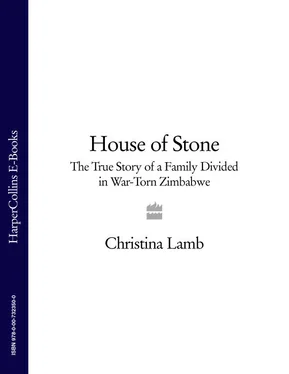Their home was a small compound comprising three rondavels , round windowless huts, inside a fence of jagged branches. Like all the huts in the village, theirs were made from mud from anthills that the women would mix up with water from the river to form sticky dough then plaster it on with their hands. I loved watching them doing it and longed for the day I would have my own hut. Some of the more artistic women used sticks to decorate them with swirls or a sharp stone to cut a diamond pattern, but her mother left theirs plain. The roof was made of dried elephant grass that the women carried on their heads in bundles from the river, and for the floor they mixed cowpats with water, which set as solid as concrete.
The biggest hut in their compound was the bedroom hut where her mother, father and surviving baby brother slept and their few belongings were kept. The only decor was a small cracked mirror and a yellowing 1966 calendar advertising tractor parts that her father had brought back from a job; there was a thin lumpy mattress on the ground and a tin trunk held clothes and a Bible.
The second hut was on stilts with a ladder of crooked logs leading up to it. That was the storeroom for mealie meal to dry, safe from the white ants that got everywhere and the rats that kept Aqui awake with their scrabbling at night as they tried to tunnel under the hut walls. The third and last hut was the kitchen hut in which they cooked the meals and Aqui and her sisters would sleep. The kitchen hut also served as the sitting room and as the female members of the family entered they would squat on the ground on the left while the men veered right to sit on a raised bench that ran all along the side. It was always smoky inside, but once a visitor grew accustomed to the gloom they would see shelves at the back moulded from the wall. On these were arranged the family's few cooking utensils and tin cups as well as two green enamel plates decorated with red flowers that her father had brought from town. The back of the hut was considered the sacred abode of the mudzimu , the ancestral spirits that protect the family, and when Aqui's siblings died they were laid on one of the shelves before being buried to help them cross the boundary to the spirit world.
In the centre of the floor was a fire in a round hearth where her mother would cook sadza. Sometimes they would eat it spiced up with relish from her mother's garden or wild fruits like marula or chakata that the chief had forbidden the villagers from selling because he believed that would cause lightning.
If the mealies were ready in the field they would roast them brown and crispy, and this was Aqui's favourite food. She thought there was nothing better than blowing off the ash and biting into the crunchy sweetness. Apart, perhaps, from the first rain when the children would all run outside and dance about, holding their hands out to try and catch the little liquid rocks which burst all around them and would turn the brown land green overnight and wash away the red dust that coated their feet and shins. In winter the cooking meant the hut would be nice and cosy to sleep in but in summer it was like an oven and horrid.
The happiest days were those when she arrived home to a yeasty smell in the air and a large oil-drum bubbling away on a fire. This would mean her mother was making Seven Days, a homemade beer of maize and rapoko millet mixed with well water, so named because it took seven days to be ready. It was this that paid for Aqui's school fees and the uniform of blue and white striped dress that she always kept immaculate.
Her mother's beer was renowned in the village. On the first day of brewing, beer drinkers would pass by and give a long sniff then say, ‘Eh, eh, that smells good, I am looking forward to drinking this one.’ After a day of simmering, the drum would be left to cool in the hut for two days and on the fourth day more rapoko added until the mixture was of porridge consistency. It was then repeatedly boiled and simmered to reduce it and more water added from the well. When the beer was ready it had a thick froth which had to be poured off through a sieve.
On the seventh day if the beer drinkers did not automatically return to the hut, Aqui would climb an anthill or rock and shout, ‘Seven Day is ready!’ Her mother would then sit by the big drum, her wide skirt arranged around her considerable girth, and ladle out the lumpy yellow liquid with a cup hooked to a long stick. She usually told me to give the first cup to the biggest beer-drinker because if he pronounced it good then others would flock in. People gave ten cents a cup if they had money, otherwise they paid in kind with cobs of corn or cabbage heads, and would sit there from morning till night, talking, drinking, playing tsoro [a kind of backgammon with bottle-tops] and fighting. The customers were almost all men but there was one married couple who would arrive early in the morning holding hands nicely, and, by the evening, be fighting like dogs.
Aqui hated fighting. Her full name Aquinata meant peacemaker and she was the family's firstborn in a land where everyone wanted a son. She also had a Shona name-Wadzanai-which her mother said meant ‘Don't shout at each other’. It was only later that Aqui would ponder the circumstances that on the long night of her birth in August 1962 had led to her parents choosing such a name rather than Precious, Blessing or Joy like her friends, or Chipo, which means Gift, like her mother.
Aquinata was the name she was christened by the Irish missionary with the shaky hands who downed her in the bowl of water and let slip. It was a story she never tired of hearing from her mother. She particularly liked the bit where for a moment there was complete silence in the room that served as a church and the congregation all held their breath wide-eyed. Her mother usually paused in the telling at that point. Then baby Aqui was retrieved and borne aloft dripping, and to everyone's astonishment she did not cry. Father Walter said she was named after a saint who was a man of peace and renounced all things. She did not really have anything to renounce, apart from her school uniform, but she liked having a distinguished name even if everyone in the village shortened it to Aqui, pronounced ack-we.
On days that Aqui had not been kept at school late to cook, when she got home, she would go to their stand or field and tend the cattle and goats. This meant swatting away the clouds of flies that hovered over their hides and picking the ticks from their skin as the animals pulled and chewed at the grass, then herding them back to their compound before the first stars lit in the sky. Her mhondoro grandmother was so wealthy from selling clay pots that she owned six cows that Aqui was sometimes allowed to milk. She loved to drink the thick yellow cream off the top.
The thing I really didn't like was ploughing. As the eldest I was expected to learn hut the mombes [cows] never stopped moving and would always pull away as I tried to yoke them to the plough. The task she dreaded most of all was trying to attach the scotch-cart. This was a trailer fashioned from planks of wood set on an axle and two wheels purloined from a car that had crashed on the road. We used the scotch-cart to collect the crops after they had been reaped and placed in lots of heaps, ready to take to the village store. I was small and the log to join the cart had to be held high up while all the time the cows would be moving.
She knew they were lucky to have cows and not just a small hoe to plough with manually like many of the villagers, but the mombes were obdurate creatures and she hated the boys laughing at her as she tried over and over again to yoke them. All the villages ploughed down the hills rather than across like the white man because it was easier. No land was ever left fallow as it was all needed for the cattle and growing maize, particularly in those years when the maize grew no higher than her waist.
Читать дальше












